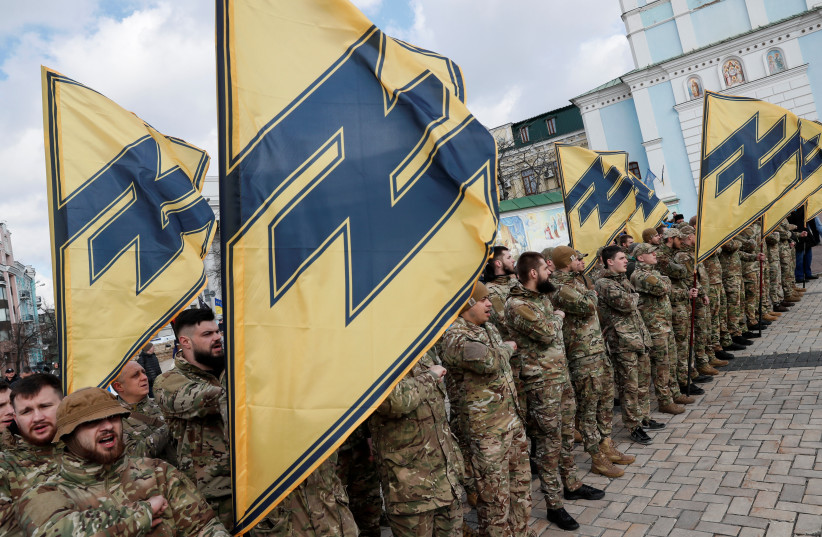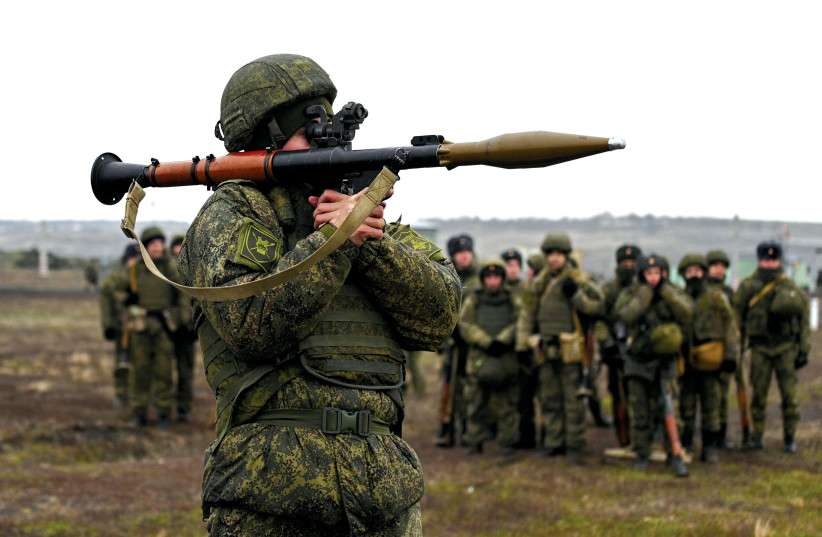Israel must immediately prepare to absorb a wave of olim should Russia invade Ukraine.
American intelligence agencies warn that Moscow is positioning 100 battalion tactical groups along Ukraine’s borders for a possible major offensive in early 2022. The 2014 secessionist conflict in Ukraine’s Donbas region, together with retaliatory sanctions against a limited number of Russian individuals and companies, dramatically increased aliyah from each country. Thirty-thousand Ukrainian olim arrived between 2014 and 2018, while nearly 40,000 came from Russia, exceeding the 36,800 Russian olim over the entire previous decade.
Unlike the 2014 war, which only witnessed violence in small pockets of Ukraine’s eastern frontier, a full-scale invasion guarantees a refugee crisis.
cnxps.cmd.push(function () { cnxps({ playerId: ’36af7c51-0caf-4741-9824-2c941fc6c17b’ }).render(‘4c4d856e0e6f4e3d808bbc1715e132f6’); });
if(window.location.pathname.indexOf(“/food-recipes/”) != -1){document.getElementsByClassName(“divConnatix”)[0].style.display =”none”;var script = document.createElement(‘script’); script.src = ‘https://player.anyclip.com/anyclip-widget/lre-widget/prod/v1/src/lre.js’; script.setAttribute(‘pubname’,’jpostcom’); script.setAttribute(‘widgetname’,’0011r00001lcD1i_12258′); document.getElementsByClassName(‘divAnyClip’)[0].appendChild(script);}else if(window.location.pathname.indexOf(“/jpost-tech/”)!=-1){ document.getElementsByClassName(“divConnatix”)[0].style.display =”none”; var script = document.createElement(‘script’); script.src = ‘https://static.vidazoo.com/basev/vwpt.js’; script.setAttribute(‘data-widget-id’,’616dd69d1b04080004ac2cc0′); document.getElementsByClassName(‘divVidazoo’)[0].appendChild(script); }else if(window.location.pathname.indexOf(“/israel-news/”) == -1 &&window.location.pathname.indexOf(“/breaking-news/”)==-1 ){ document.getElementsByClassName(“divConnatix”)[0].style.display =”none”; var script = document.createElement(‘script’); script.src = ‘https://static.vidazoo.com/basev/vwpt.js’; script.setAttribute(‘data-widget-id’,’60fd6becf6393400049e6535′); document.getElementsByClassName(‘divVidazoo’)[0].appendChild(script); }
According to the American Jewish Year Book 2019, approximately 200,000 Ukrainians are eligible to make aliyah under the Law of Return. Although most neither identify as Jews nor are halachically Jewish, tens of thousands seeking refuge might apply for Israeli citizenship.
Simultaneously, severe Western sanctions could motivate some of the 600,000 Russian citizens eligible for aliyah, also mostly non-Jews, to contemplate emigration. Just a week after Secretary of State Antony Blinken threatened that a Russian invasion would trigger “high impact economic measures that we’ve refrained from taking in the past,” EU foreign policy chief Josep Borrell announced, “Any aggression against Ukraine will come with political consequences and with a high economic cost for Russia.” Accordingly, any Russo-Ukrainian war would precipitate a Russian financial meltdown.
 Members of Azov battalion attend a rally on the Volunteer Day honouring fighters, who joined the Ukrainian armed forces during a military conflict in the country’s eastern regions, in central Kiev, Ukraine (credit: GLEB GARANICH/REUTERS)
Members of Azov battalion attend a rally on the Volunteer Day honouring fighters, who joined the Ukrainian armed forces during a military conflict in the country’s eastern regions, in central Kiev, Ukraine (credit: GLEB GARANICH/REUTERS)
Israeli demographer Sergio DellaPergola estimates 426,700 non-Jewish Israelis, just under 5% of the population, are citizens due to the Law of Return. Immigrants from the former Soviet Union (FSU) and their descendants constitute virtually all of them. Although Israel’s Chief Rabbinate frequently fulminates against non-Jewish FSU immigrants – Sephardi Chief Rabbi Yitzhak Yosef denouncing them last year as “communists hostile to religion” – Naftali Bennett’s government may prove uniquely sympathetic.
Yisrael Beytenu, a party specifically representing FSU immigrants’ interests, controls the Finance Ministry, while every haredi faction sits in the opposition. Because Shas and United Torah Judaism have increasingly allied themselves with Likud, centrist and left-wing secular parties dominating Bennett’s government (i.e. Yesh Atid, Blue and White, Labor, Meretz) would probably welcome expanding Israel’s FSU demographic for political advantage.
Similarly, Labor welcomed the 1990s post-Soviet aliyah, predicting it would counterbalance Likud’s Mizrahi base. Both Labor’s 1992 landslide parliamentary victory and Ehud Barak’s successful 1999 prime ministerial campaign relied on FSU voters. However, Russian-Israelis increasingly embraced secular nationalism. So even Bennett’s Yamina party, which prioritizes settlement over religion, might celebrate an influx of incipient Israeli nationalists to bolster Greater Israel’s non-Arab population.
Whether Bennett’s government decides that accepting a wave of halachically non-Jewish Ukrainian and Russian olim is desirable or not, it must prepare for a refugee crisis that could materialize within weeks. That entails immediately allocating extra funds for immigrant absorption, or at the other extreme, rephrasing the Law of Return.
The writer is the Washington resident fellow of the Middle East Forum.

